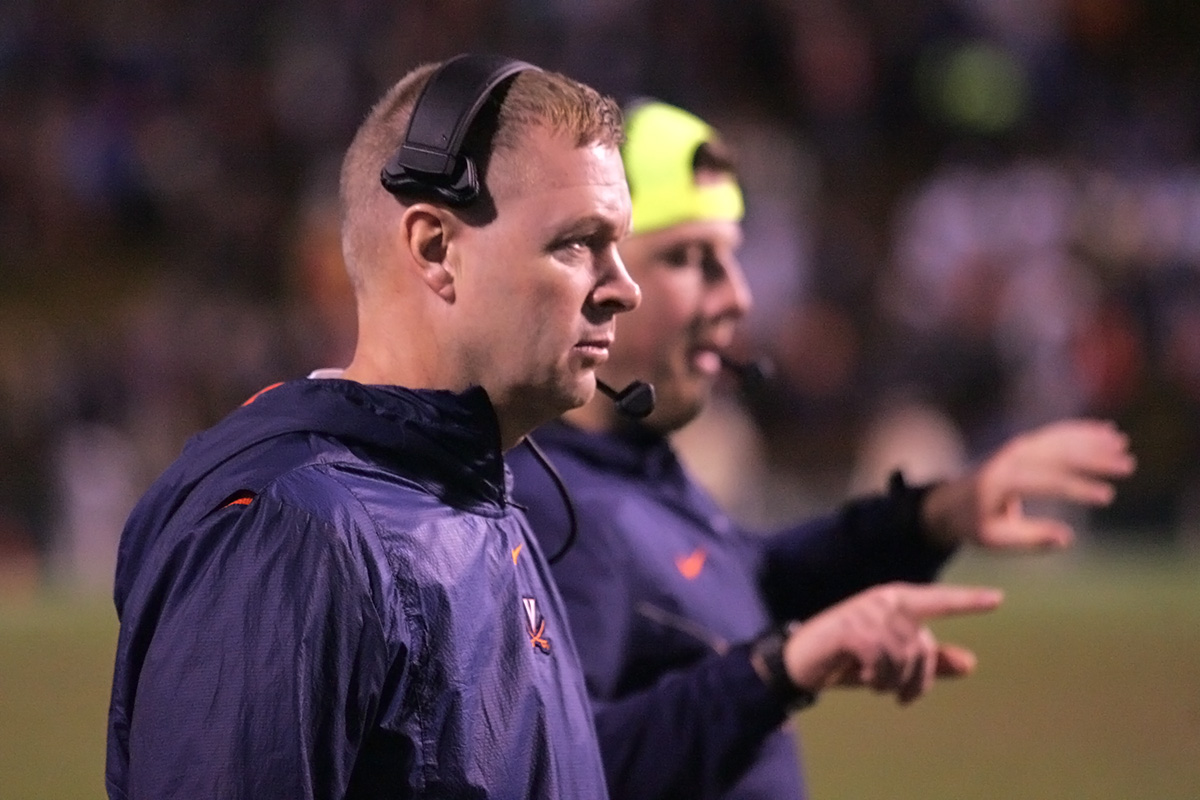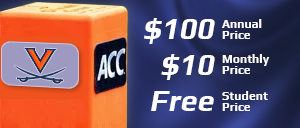
The Big Ten Conference announced last week that it would play a conference only football schedule for the 2020 season and the Pac-12 made a similar decision shortly afterward. The Chick-fil-A Kickoff organizers are making contingency plans if other Power-5 conferences follow the league only path as well. These steps are the latest pandemic-related decisions facing colleges around the country as everyone tries to figure out what a potential football season might look like.
For Virginia, who is scheduled to open the season with Georgia on Monday, Sept. 7 in one of those kickoff games, the focus as required workouts began this week remains on the Bulldogs for now. UVA coach Bronco Mendenhall said that has to be the approach while other colleges and conferences – the ACC announced it would make a decision by late July – work through the scheduling decisions.
“We still have to anticipate and prepare as if we’re opening on time,” Mendenhall said. “It might be like a special forces unit or a unit that’s training and preparing and waiting to get a green light to be called on a mission, but you’re never sure if the green light is actually going to go on. It might stay red, but you have to be ready as if it’s going to go off at any time. So the safest and best thing for us and to reach all of our goals – and especially for our guys that have been in the program and really would like a magical season – the best thing I can do for them is act as if we’re going to play, and play in our opener, have a plan for that, and anything else that happens after that, we’ll adjust. Mostly that will be adjusting down, not up. It’s always easier to ramp down than ramp up so we’re going to prepare as if we’re opening with Georgia. We’ll prepare as if the season will happen. We’ll prepare as if we want to keep all of our goals intact. Acknowledging at the same time, this is the Stockdale Paradox right? You never lose faith in the end of the story, but you have to acknowledge the brutal facts. We have to acknowledge, could there be a delayed season? Yes. Could there be a shortened season? Yes. Could there be a conference only season? Yes. However, until then we’re preparing to play Georgia.”
The Virginia players returned to Charlottesville for voluntary workouts early last week. Prior to that, they had not been on Grounds since the University closed following spring break as the coronavirus concerns began to spread nation wide. The decision to close the school meant that the Hoos lost spring practices. In order to get the conditioning workouts going this month, UVA tested 110 student-athletes and installed a list of safety protocols dealing with everything from dorm life to workouts to food distribution. Those tests returned with two positive cases for COVID-19 and those players, along with any contract traced players, were quarantined.
Mendenhall got his first session with workouts starting Wednesday. The coaches filled the gap from March to July with Zoom video meetings on a regular basis, which included heavy doses of film review and teaching points. Mendenhall said Monday he wasn’t sure how much impact losing spring practices would would have or how much the video work might offset the lost field time. He said the amount of hours on those video calls actually exceeded what would have happened in spring practice, maybe by as much as double.
That’s not the same as being on the field taking reps, though, so the X’s and O’s preparation level remained to be seen.
“We’ll find out. It’s a great experiment. … I don’t know if it will translate directly,” Mendenhall said. “I don’t think there’s anything like actually participating. However, we have maximized and had as much content and discussion, presentation, and teaching online to help. … I’m hopeful we’ve done everything we could to close the gap.”
That gap might be tested against ACC competition only if the league follows the Power 5 and Pac-12 path. Mendenhall told reporters that he’s in favor of that route simply because it would provide some consistency with coronavirus testing and protocols.
“Yes, I am in favor of it. … When you control the controllables by playing teams only in our region, only in our conference, we have a better chance to standardized protocols in terms of testing, we have a better chance to lessen cross country travel, we have a better chance to mitigate any concerns about lack of consistency because we are within conference,” Mendenhall said. “There’s already been suggested models about how that might work, but anything that reduces travel, reduces air travel, increases proximity play, and keeps our players safer, I’m for that. We have a better chance to control that in conference than out of conference. That’s why I’d be for it because I think it benefits and gives our student-athletes the best chance to be safe and play knowing that’s what they want to do.”
Within a conference only model, there could be options as well. The league could keep teams aligned within the Atlantic and Coastal Division and play those opponents plus the scheduled cross-division opponents. For Virginia, the permanent Atlantic partner is Louisville and this year’s rotating partner is Clemson.
There is also the possibility of pods. That model would create three five-team groups based on geographic proximity as much as possible. The proposal could include home and away games against those four opponents for a total of eight games. One example floated around social media and on the message boards would place Virginia with Virginia Tech, North Carolina, Duke, and NC State.
Notre Dame would be included in the conference only plans.
Mendenhall said he didn’t prefer the pods approach, but acknowledged that his year’s circumstances might make that the most viable choice.
“I’d prefer not to play each team twice, but this isn’t really a time where we get a lot of just normal choices so if regional pods … keeps the team the closest, the safest, and gives us the best chance to play football, and for them to be together and reach their goals, then I would be for that,” Mendenhall said. “This is a time for innovation and unique solutions to do the very best we can under the circumstances. I think that proposal has merit. I’d much prefer to play each team once, not twice but again that expands the regional play and I think that probably puts us at more risk than local play and so the regional pod idea might be what the best thing is for us this year.”
The ACC could choose to adopt a hybrid of sorts too. Instead of playing only conference games, the league could add one or two non-conference opponents without expanding to a full slate of 12 games. One idea that the Chick-fil-A Kickoff organizers mentioned was to pair up Virginia and West Virginia for example to replace the Georgia game. There have been some murmurs as well about an SEC-ACC partnership to preserve some in-state rivalry games and to provide one non-conference contest in addition to the members’ league games.
If all of that falls by the wayside, Mendenhall said he would be willing to consider a regionalized slate of non-conference games as well.
“I would prefer divisional play and crossover [opponents] as close as possible in terms of scheduling within our league,” he said. “If for some reason, we couldn’t get that architected correctly, yes I would play regional games. … If for some reason, we couldn’t get that designed appropriately within conference, the next best option is then to look at who’s closest and then consider those options as possible non-conference, but I prefer conference first.”
That’s a lot of juggling obviously to try to salvage college football and the revenue it generates. The various options raise a connected question as well. How many games is enough during the time of a pandemic? Mendenhall has a clear number in his head that would legitimize the season while navigating the protocols and coronavirus concerns.
“I think anything less than eight would be really difficult to ask our players under these circumstances, especially some that want the NFL, especially some considering redshirting, especially just with all the things [going on],” Mendenhall said. “They want to be together, they love each other, and they want to play. Under all these unique circumstance and wearing the masks and doing all of that, they’re having a blast together and I’m loving that part of it, [but] anything less than eight wouldn’t be appropriate to ask of them. That’s the minimum cutoff I have internally just based on my own threshold, nobody else’s. Anything more than that, I think would be worth it. Anything less would be hard to justify. I understand the revenue part, I understand the athletic department’s need for resources, I understand the affect on other sports, and I want to help that at the highest level as well so that is about where I think we can go. I might change as I become more educated over time or as the scenario changes, but if I’m answering today that’s where I would put it.”
The potential for the scenario to change exists. Many states have reported increased coronavirus cases. Some schools like Maryland and Ohio State paused voluntary workouts within their programs following small clusters of positive tests.
Mendenhall said that he speaks with Virginia Director of Athletics Carla Williams almost every day to keep track of developments. One thing that he said she shared with him and that he then passed on with the team was to take the coronavirus seriously and to take the appropriate steps to mitigate risks, noting that the “only thing more dangerous than ignorance is arrogance.” That means following the protocols and wearing masks among other things.
Those steps are necessary, Mendenhall said, in order to try to play college football this fall. He said he believes playing games and preserving a schedule is possible, but it will be challenging.
“It’s possible, but incredibly challenging,” Mendenhall said. “I’m really encouraged by our start; our numbers would represent less than 1% basically of our team, which if you look nation wide or testing wise, it’s about as safe an environment you can find, maybe on the planet. That’s the starting point. I just tried to explain the protocols helping us do that to this point. Now when you consider another team doing that, and then arriving to a place and both teams doing that, then trying to play and going back to regular protocols at home and then keep that up for possibly 14 weeks based on how successful you are – oh and by the way, here comes the reset of the students who certainly aren’t going to follow the same protocols as the higher standard expected by the athletes in these unique cultures to perform – that’s going to be one other challenging component. So possibly, yes. Challenging would be an understatement.”



